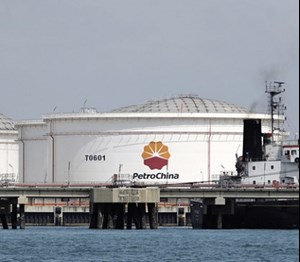PetroChina's slump seen ignoring value of pipeline spinoff
HONG KONG (Bloomberg) -- PetroChina Co.’s slump to the lowest in six years may be ignoring the potential value from spinning off its huge pipeline network as part of the country’s energy industry reforms.
Shares of China’s biggest oil and gas producer are trading in Hong Kong at the lowest since the global financial crisis, reflecting a plunge across the industry as oil prices collapse. The company, which has lost more than 45% in the past year, closed Monday at the lowest since March 2009. The stock isn’t reflecting the “goldmine” of its 77,000-km (47,855- mi) pipeline network, according to Laban Yu, a Hong Kong-based analyst at Jefferies Group LLC. Shares were trading down 0.5% at HK$5.69 at 1:34 p.m. local time.
“Pipeline assets alone could be worth HK$3.55 a share, but there’s zero consideration for such assets in the current stock prices,” Yu said. “It’s the elephant in the room.”
The Chinese government is looking to spin off oil and gas pipelines from its energy companies into independent businesses as part of a sweeping industry overhaul, people with knowledge of the plans said in May. Reforms of the country’s energy sector will be released this year, Lian Weiliang, vice chairman of National Development and Reform Commission, said Monday in Beijing.
"Now with a clear guiding principle of separating pipeline owners from operators, we expect to see pipeline restructuring speeding up at PetroChina," analysts at Credit Suisse Group AG said in a report Tuesday. "We believe that PetroChina has broadened the scope of its pipeline restructuring to include not only gas pipelines, but also crude oil and refined product pipelines."
Tumbling crude prices crimped profits in the first six months of the year at energy companies from Exxon Mobil Corp. to BP Plc. to China’s biggest refiner, China Petroleum & Chemical Corp. PetroChina’s first-half profit dropped 63% to 25.4 billion yuan ($4 billion).
By one measure, PetroChina may have fallen too far. Among the world’s 10 biggest publicly traded oil companies, it has the lowest price-to-book ratio, a comparison of its share price to the value of its assets, according to data compiled by Bloomberg.
Exxon Mobil, the world’s biggest oil company by market capitalization, has a price-to-book ratio of 1.75, while third- ranked Royal Dutch Shell Plc is 0.89. PetroChina’s is 0.73.
“PetroChina’s assets are extremely undervalued, especially with its Hong Kong-traded shares selling below book value,” said Gordon Kwan, a Hong Kong-based analyst at Nomura Holdings Inc. “The stock will rebound soon and outperform the market in anticipation of sizable gains from pipeline network divestments amid China’s state-owned enterprise reforms."
Right Direction
Spinning off pipeline assets from state-owned energy companies is the right direction for China’s reform, PetroChina President Wang Dongjin said in March in Hong Kong, without giving further details. The company’s pipeline assets may be worth about $150 billion, according to an estimate by Neil Beveridge, a Hong Kong-based analyst at Sanford C. Bernstein. A Beijing-based PetroChina spokesman didn’t answer two calls to his office seeking comment.
China has about 120,000 km of oil and gas pipelines. PetroChina owns about 77,000 km, while China Petroleum, known as Sinopec, owns about 30,000 km.
“If you don’t panic and still look for high-quality stocks to invest in amid all the market volatilities, PetroChina should be one of the sure-handed bets,” said Yu, who has an outperform rating on the stock with a target price of HK$12.25.



